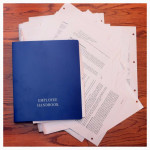 By Kathryne Baldwin* and Samson R. Elsbernd, Esq.
By Kathryne Baldwin* and Samson R. Elsbernd, Esq.
The National Labor Relations Board (“NLRB”) enforces the federal National Labor Relations Act (NLRA), which applies to most private employers. Periodically, the General Counsel of the NLRB releases reports to clarify issues that arise in the workplace. One of the more recent reports discusses the lawfulness of employee rules found in a number of different employee handbooks. Section 7 of the NLRA protects the rights of all employees, not merely unionized employees, to communicate with one another or third parties at or away from work regarding terms and conditions of employment. Section 8 of the Act makes it unlawful for employers to interfere with, restrain or coerce employees in the exercise of their Section 7 rights.
Many of the examples of unacceptable employee handbook language were provisions containing broad, general language that would encompass Section 7 rights, whether or not that was the employer’s intention. Section 7 allows employees to be critical of their employer and management. Consequently, a handbook provision requiring employees to “[b]e respectful of others and the Company” would violate Section 7 because the rule would prohibit employees from criticizing working conditions and labor policies. Similarly, employers cannot institute general prohibitions on “negative” or “inappropriate” discussions among employees, but could more narrowly ban harassment of employees or prohibit the “use of racial slurs, derogatory comments, or insults” by employees.
Policies requiring employees to direct or refer all inquiries from the media or government to a particular person in the company would also violate Section 7 because employees have a right to speak about employment matters and labor concerns. Employers have a right to present their official position, but employees also have a right to communicate with the media, government and other third parties on their own behalf.
A handbook provision instituting a general prohibition on the use of company logos without permission would also run afoul because Section 7 protects non-commercial use of company logos by employees on protest materials, such as picket signs or leaflets. Section 7 would not protect employees in disparaging the employer’s product or customers, though.
The NLRB appears to be taking a greater interest in non-unionized workplaces under Section 7, and non-unionized employers should take note. Ultimately, whether a provision will be permissible will depend on how employees would interpret the clause, and context matters. Clauses that would otherwise be impermissible may be fine if employees would understand them to be limited in scope so as not to interfere with their Section 7 activity. Employers should review their policies (including email and social media policies), arbitration agreements, and handbooks to ensure compliance with Section 7 and the NLRA’s recent guidance. Otherwise, they could face an unfair labor practice charge prompting an investigation and an administrative action to remedy any unfair labor practice.
DID YOU KNOW…
The U.S. Supreme Court recently ruled that an employer may not discriminate against a job applicant’s religious beliefs during the hiring process under federal law (Title VII), even if the employer does not have actual knowledge of the need for a religious accommodation. E.E.O.C. v. Abercrombie & Fitch Stores, Inc. (2015) 135 S.Ct. 2028, 2031 (failure to hire Muslim applicant who wore a headscarf because the headscarf conflicted with company dress code).
* Kathryne is currently a law student at The University of the Pacific, McGeorge School of Law and was hand-selected for a 2015 summer clerkship with Wilke Fleury. She is also a member of McGeorge’s Nationally Ranked Mock Trial Team and is President of the McGeorge Women’s Caucus.


